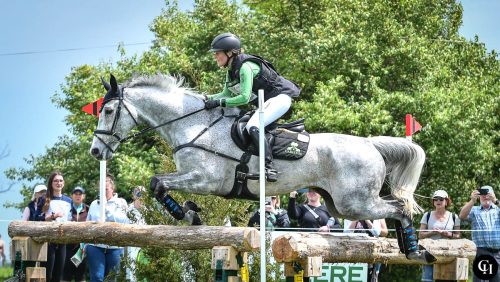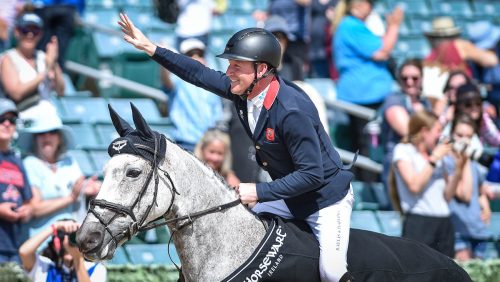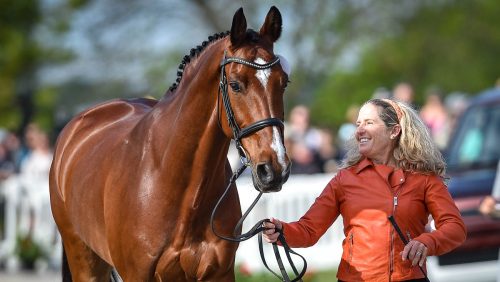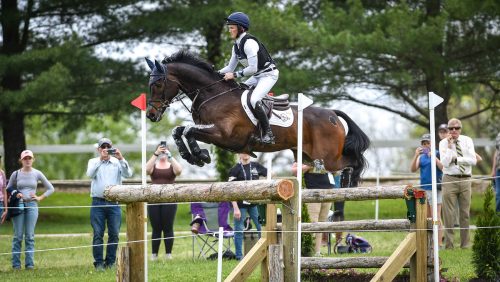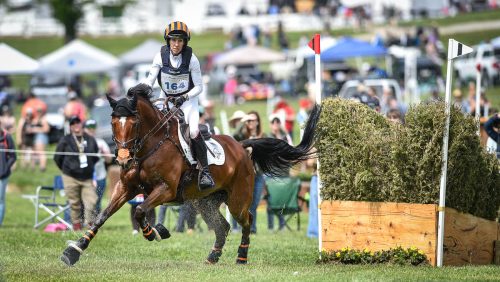The news that the Fédération Equestre Internationale General Assembly voted to change the competition format of all three disciplines at the Olympic Games—dressage, show jumping and eventing—on Nov. 22 wasn’t universally well received.
The major changes that riders—especially show jumpers—spoke out against were the shift to a three-man team and the elimination of a drop score.
The federations of both the United States and Canada voted in favor of the changes. “After careful assessment with much involvement from key stakeholders, we came to the conclusion that without the change in Olympic format, it was likely that one of our Olympic disciplines would be dropped from future Olympic Games. This would be unacceptable,” said USEF president-elect Murray Kessler of the USEF’s vote in support of the changes.
In March, the U.S. Equestrian Federation had released a statement through the U.S. Eventing Association indicating that the USEF’s stance toward the three-man teams and elimination of the drop score in eventing as not supporting the rule changes.
In regards to the three-man teams, the USEF’s position stated: “This would make the sport about completion and not about competition. The statistics show very clearly that if there are three in the Team for cross-country with no drop score either a significant number of Teams will not complete or the cross-country will be dumbed down to an extent that the very essence of eventing is destroyed.”
When contacted for clarification on the USEF’s change in stance, Kessler and USEF CEO Bill Moroney drafted a response that indicated that: “the driving factors which ultimately drove the decision for USEF to vote ‘Yes’ on the format changes included:
1. Keeping show jumping, dressage, AND eventing all in the Olympic Games
2. Agreement to protect the current format for each discipline at all other major championships
3. No reduction in Team USA members providing that under the new format, the ACTIVE reserve is utilized.
4. Supporting the FEI and IOC’s goal to give more countries in the world the opportunity to participate
5. Supporting the effort to make the sport easier to understand and fan friendly (the drop score was confusing)
6. Numerous other revisions to the details of the format changes that were made as the result on constructive dialogue in the various committees and forums leading up to the General Assembly vote”
In addition, the USEF negotiated some delays to or eliminations of other proposed FEI rule changes that USEF officials believed would have compromised U.S. riders’ access to five-star competitions. This included delaying by a year a rule change that would prevent riders from cross-entering between FEI and national classes at the same competition and delaying rule changes that would have increased fee structures.
U.S. show jumper McLain Ward, a veteran of four Olympic Games with two team gold and one team silver medals, noted that most U.S. show jumpers prefer the current Olympic format. “I think there is a sense among the riders of a little bit of disappointment,” Ward said. “The majority of the riders, as far as I know, didn’t want the format to change. But I’m not involved enough in the decision-making process to know the ins and outs of discussion with governing bodies larger than our sport.
ADVERTISEMENT
“At first glance, I prefer the system that was in place—four riders with a drop score. I prefer it 100 percent. But I’m not well enough informed to know what the IOC demands are to weigh in more than that,” Ward continued.
“I also don’t like that the Olympic Games are basically going to come down to one round for both the individual and the team medals. Many of us already think that two rounds isn’t cumulative enough, but there are a lot of factors to weigh in here from non-horseman parties that are involved in deciding our participation in the Olympic Games.”
Not What The Riders Wanted
After the vote, Canadian riders Eric Lamaze, Yann Candele and Tiffany Foster released a statement expressing frustration with the Canadian federation’s vote in support of the changes.
Lamaze, who was the 2008 individual show jumping Olympic gold medalist, stated that Equine Canada had met with riders at the Rio de Janeiro Olympic Games and discussed the proposed changes. “It is hard to get all of the riders to agree on something but, on this point, the riders in Rio were unanimous; we were all against it,” Lamaze said. “Given the outcome of our meeting, it comes as a complete shock that Canada voted in favor of the proposed change to three-man teams. The current format works, and I want to make it clear that we believe the new format is not good for our sport on many different levels,” concluded Lamaze. “I am extremely disappointed, and feel that our national federation did not appropriately represent or respect the wishes of its athletes.”
Canada and the United States were joined by the majority of the 107 voting nations in voting yes for the format changes; among the 11 voting against them were European powerhouse nations France, Germany, Switzerland and the Netherlands.
Foster sits on the board of both the North American Riders Group and the International Jumping Riders Club and said both organizations recommended against the proposed changes to a three-man format. She also noted that Canadian athletes were frustrated with Canada’s affirmative vote. “We wanted to be aligned with the other powerhouse nations in our sport in saying that we were against this change. Instead, Canada is now on record as saying this is what we wanted when it wasn’t. It is frustrating and extremely disappointing that our own federation did not act in accordance with what we were told.”
Irish rider Cian O’Connor took to Facebook to express his dismay at the Irish federation’s vote to support the format changes. “Why would Horse Sport Ireland not seek the riders’ views on proposed Olympic format changes? Then when the view was given by the riders the HSI delegate voted the opposite way—who mandated him?
“Lip service and placating is part of the reason that we have not qualified a team for three Olympic Games and now amateurs are running the sport at High Performance level in Ireland which I personally will not stand for. These rule changes will effect people in the future and will make it almost impossible for young riders to break through,” O’Connor wrote.
Robert Dover, the four-time Olympian and U.S. dressage chef d’equipe, weighed in: “I think you can safely say the major powers were all against the idea of changing from the four-man team. We have tried a three-man team multiple times in my career; it’s gone back and forth. In 1984, from my very first Olympics, it was a three-man team.
“What it does is when you have a country so deep in super talented riders and horses, you want to be able to show those top riders and horses off. When you diminish the team by one of those, it means there will be one less top Olympian—both horse and rider—in that Olympic Games, which is a sadness for those who have been working their entire lives to make an Olympic team,” Dover said.
“On the other hand, they’re trying to get more universality and more flags. Whether creating a weaker competition is better, when it comes down to when you get past teams to individuals, it may not be as strong a pool as it would be. The Germans would say the same; the Dutch would say the same. Let’s say this: They want to keep us in the Olympic family, so depending upon how complicated that is then, it’s more probable they’re doing the right thing.”
Voices Against
In a statement, the German National Federation Secretary Soenke Lauterbach spoke against the format change, but made it very clear that Germany will respect the democratic process. “We understand the desire to get more universality in the Olympic and Paralympic Games, but it has to be balanced with the core principles of our sport, that we have top athletes, top level sport and in line with horse welfare requirements. We do not feel that with three per team we have the right balance of these three principles and that is why we [voted against], but we will accept and work with whatever decision is made.”
ADVERTISEMENT
Most of the riders decrying the format change publicly were show jumpers. The International Jumping Riders Club put together video statements from top European riders before the vote that made it clear they didn’t support the changes.
“I think it is very important at the Olympic Games to keep a drop score,” said German rider Meredith Michaels-Beerbaum. “Can you imagine being on a team where there are only three riders, and you’re the last to go and you’ve watched the first rider fall off or get eliminated, so there is no chance for that team. There’s no interest for you to ride and the game is over. I think this would ruin the sport and the excitement of the sport. I think it would be a disaster for our competitions.”
The 2012 individual Olympic gold medalist, Steve Guerdat of Swizterland, was vehement in his opposition to the changes. “I am strongly against the three-rider format and the proposal. I think it’s a bad thing for the sport that I really like and have supported for many years,” he said.
“We’ve seen great sport in the last Nations Cups, in the Olympics, and I think the best of the sport comes out in those occasions and it was only possible because of the drop score and because of having four riders on the team. I think the new format, with three riders and no drop score, is just going to be a bad thing for my sport. I regret and cannot understand how people are willing to go in this direction.”
A Mockery Of The Sport
Equestrian Sports New Zealand cast a vote not supporting the format changes and in a statement after the vote ESNZ high performance director Sarah Dalziell-Clout called the format change a “real game-changer for eventing.”
“We voted against the proposed changes because of the detrimental effect it will have on the discipline of eventing,” said Dalziell-Clout. “While these changes have marginal impacts on jumping and dressage, the impact upon eventing is significant.”
Legendary eventer Mark Todd, who has represented New Zealand in seven Olympic Games in eventing and show jumping, also spoke out against the changes. “The sport didn’t need changing or fixing but this has been done to try and stay in the Olympics,” said Todd. “It is disappointing the FEI didn’t pay attention to the opinion of the people involved in the sport. In the end the majority vote was for the change to three riders per team but most of that is from countries that have absolutely no sport representation at all.”
Like O’Connor, Todd worried that three-man teams might discourage young riders with international aspirations. “I can see a lot of younger people walking away—they will think they have a greater hope of making a team of four than three, so it may put them off. Most people in eventing didn’t want the change—it changes the whole complexion of the sport,” he said. “They said it was confusing to start with but now you could end up with a team finishing with horses who have been eliminated—it makes a mockery of the sport.”
Dalziell-Clout brought up the idea that the same format changes shouldn’t have been applied to all three disciplines. “It is, however, disappointing the FEI didn’t split the vote between the disciplines—you can’t be voting on something that has such a different effect on eventing, jumping and dressage in a single vote,” she said.
Another New Zealand eventer, Jock Paget, had a more optimistic view of the changes in eventing. “Overall, we are all in the same boat so it will be a matter of adapting to the new system and making it work for you rather than against,” said Paget. “I think it will certainly make for a more tactical game.”
“There’s no doubt that the Olympic dream drives the sport,” said Robert Dover. “That’s with all sports within the Olympic family. If it were not so, you wouldn’t see so many sports worrying about being on the chopping block, and so many sports trying to get into the Olympic family. That Olympic dream drives everything about our sport, from the prices of horses to where people go to train and ride and compete. Everything revolves around it.
“There are a lot of things [that changed], and it will remain to be seen how well it all works out. I’m sure we’ll have a big powwow afterwards, worldwide, and see if it was a good formula,” Dover continued.







